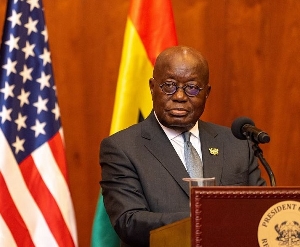- Home - News
- TWI News | TV
- Polls
- Year In Review
- News Archive
- Crime & Punishment
- Politics
- Regional
- Editorial
- Health
- Ghanaians Abroad
- Tabloid
- Africa
- Religion
- Election 2020
- Coronavirus
- News Videos | TV
- Photo Archives
- News Headlines
- Press Release
Business Features of Monday, 25 March 2024
Source: africansonchina.com
Ghana’s Anti-LGBT+ Bill: The future prospects and China’s role
Ghana’s parliament approved a controversial anti-LGBTQ bill near the end of February, which, according to the Ministry of Finance, may jeopardize critical international aid if enacted. The bill which awaits presidential assent has drawn local support and international condemnation. This legislative action has catapulted the country into the centre of a global debate on human rights, sexuality, and cultural sovereignty.
What are the economic implications for Ghana, particularly in light of potential sanctions or withdrawal of aid by Western countries? And how does China’s role as Ghana’s top trading partner and key investor play into this scenario?
Fear of Losing Western Aid and $3 Billion IMF Loan Agreement
The bill, which proposes stringent penalties for LGBTQ+ individuals and advocates, has been met with staunch opposition from human rights groups and Western governments. The United States has expressed significant concern over the proposed law and has called for a review of its constitutionality. These entities assert that the legislation violates fundamental human rights and have warned of potential repercussions, including the withdrawal of financial aid and the imposition of sanctions.
Ghana, which is currently under an IMF program to stabilize its economy, risks losing billions in support from Western donors—a prospect that could further strain its financial standing and hinder developmental projects. A document from the finance ministry of Ghana which was widely circulated reveals that the bill’s enactment could result in the forfeiture of approximately $3.8 billion in World Bank funding over the next five or six years, potentially disrupting a $3 billion IMF loan agreement.
The United States and other traditional Western donors have a history of tying aid and financial support to the adherence to certain values, including human rights considerations. The passage of this bill has threatened to strain several relationships between Ghana and Western countries. Also, it will lead to a re-evaluation of their financial commitments to Ghana, a move the West African country will be mindful of.
Is China’s non-interference policy a counterbalance to Western influence?
However, there is another player in the geopolitical arena whose influence cannot be overlooked: China. China has become an increasingly significant investor and trade partner to many African countries, Ghana included. Unlike Western donors, China is known for its policy of non-interference in the domestic affairs of its trade partners, often providing aid and conducting business without explicit political or social strings attached.
This approach has allowed China to solidify its presence in Africa, offering an alternative source of funding for infrastructure projects, loans, and investments. For Ghana, this could mean that even if Western financial support diminishes due to the new legislation, China might step in to fill the void, further deepening its influence in the region.
China’s potential to counterbalance the loss of Western funding presents Ghana with a strategic option, albeit one that comes with its own set of considerations. Critics argue that reliance on Chinese aid may lead to unsustainable debt levels and could compromise Ghana’s sovereignty over its resources and policy-making.
Furthermore, Chinese investments are not without their conditions, often requiring the use of Chinese firms and workers in projects, which can limit local employment and technology transfer.
Supreme Court Challenge: A Test of Ghana’s Laws
President Akufo-Addo, addressing the bill for the first time since its passage by Parliament, assured that Ghana’s commitment to human rights would remain steadfast. He also mentioned that the bill is currently facing a legal challenge in the country’s Supreme Court.
“The Supreme Court is presently reviewing a challenge that was filed today,” Akufo-Addo stated. There are currently two pending cases at the Supreme Court all against the signing of the bill into law. President Akufo-Addo as a result sent a letter to the Clerk to Ghana’s Parliament asking him not to remit the passed bill to the President for his signature.
However, that singular act by the President has turned into a game of powers between the Executive and Legislative arms of government in Ghana. The Speaker of Parliament, Alban Sumana Kingsford Bagbin, a supporter of the bill has halted the process to vet and approve new ministers and deputy ministers appointed by the President. The Speaker said there is a legal case at the Supreme Court against the process and he has to respect it to safeguard the country’s democracy.
Ghana’s Attorney General got involved as he was forced to write to the Speaker explaining that the case does not have the legal grounds to stop the ministerial vetting and approval process. So apart from the external pressure from Ghana’s international partners, there is a brewing internal battle.
Could China be part of the available choices for Ghana?
As Ghana navigates the potential economic fallout from the passage of the Human Sexual Rights and Family Values bill, alias the anti-LGBTQ+ bill, it will have to carefully consider the long-term implications. The country could decide to take a leap of faith, trust in its strengths and damn whatever consequences the threats from supposed Western powers may bring. That would be a decision that would resonate with the masses who seem to unanimously support the bill.
Economically, the country could then turn to China for support as it has done in the recent past. It is not without clearly noting that pivoting towards Chinese support has its attendant ramifications. Whatever the case, the government of Ghana must weigh the benefits of cultural sovereignty and legislative autonomy against the economic risks posed by alienating its Western partners.
The situation presents a complex challenge for Ghanaian policymakers. While the new legislation aligns with the conservative values held by a majority of the population, the country’s economic future is a major determinant. Ghana’s economy currently enjoys considerable support from international partners, especially the Bretton Woods institutions. So finding a perfect balance in its international relations with its socio-political agenda is key due to its enormous dependence on foreign support.
China’s role as an influential investor provides Ghana with an alternative pathway, but it is not without its own set of complex dynamics and future implications. Nothing comes free from anyone anywhere and Ghana must already be aware of this long before now.
In conclusion, Ghana’s chances going forward, given the anti-LGBTQ bill, will primarily depend on how it handles its foreign relations and any prospective changes to its economic alliances.
The IMF has reiterated its internal policy of non-discrimination based on personal characteristics and stated it could not comment on the potential implications of a bill not yet signed into law. The IMF and World Bank have previously withdrawn support from other African countries that passed similar anti-LGBTQ laws including Uganda.
In the wake of the widely circulated memo by the finance ministry, there have been suggestions of the country turning to more conservative countries, including Arab nations and China for financial aid.
And importantly, the role of China as a key player in this equation underscores the changing landscape of global power dynamics, where Ghana can explore the opportunities of aid rather than putting all her eggs in one basket.











